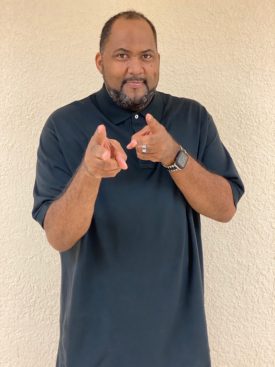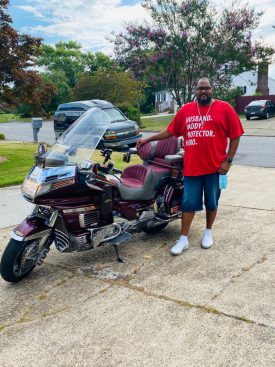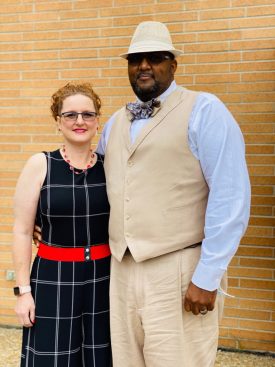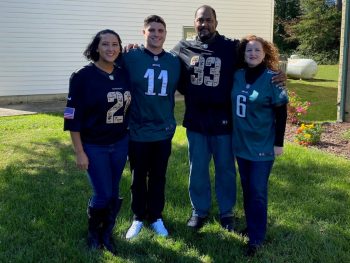Anthony

Anthony had long known about a heart condition that caused his heart to race, but the EMS professional was unaware of his type 2 diabetes until the day he nearly died.
For Anthony Wilson there’s nothing quite like seeing the world from his motorcycle.
On weekends, Anthony and his wife, Sheila, will often pick a destination, hop on their bikes and hit the road. They belong to a motorcycle club that does volunteer work, “collecting food, having a toy run, things like that,” Anthony explains. “That’s the most rewarding part.”

An Emergency Medical Technician for more than 30 years and current operations manager of an ambulance support services division, Anthony has always had a passion for helping others. But one fateful day back in 2012, he was the one who needed urgent help.
That morning, Sheila woke him up and told him he didn’t look so good. He had dark circles under his eyes, and his skin looked gray. Increasingly worried, she insisted on taking him to the hospital.
“Normally I leave before he wakes up, but when I got up for work that day, something told me to get him up,” she said. “It was the grace of God.”
Ironically, Anthony and Sheila had recently decided to get healthy, walking, running and doing weight training at the local gym.
At first, things seemed to be going better than they had hoped, especially for Anthony.
“I was losing a lot more weight than she was, and liked to joke about it, ‘Don’t I look good?'”

But he wasn’t just slimming down. He was constantly thirsty and wondered why he craved mango juice. And he had to use the bathroom every few minutes — peeing as fast as he could drink it. Not to mention the fatigue. While he continued to work full-time, he’d be asleep for the evening shortly after he made it home.
“Even with my medical background, it never even occurred to me that it could be diabetes,” he said. “I thought it was my metabolism working overtime.”
Finally acknowledging he was sick, Anthony agreed to go to the hospital and began walking down the stairs to the front door. The next thing he remembers is waking up in the ICU.
For years, he had suffered from supraventricular tachycardia, or a fast heart rate, and his heart was pumping at 220 to 230 beats per minute. Adding to the doctor’s concerns, his blood pressure had dropped through the floor and his blood glucose (1098) and A1C (17.3) were off the charts. His organs were failing. Doctors shocked his heart in search of a life-supporting beat. Twice.
“Everything was breaking down,” Anthony said. “Had she not taken me to the hospital when she did, the doctor told my wife I would have been dead in the bed when she got home.”
Anthony stayed in the hospital for a week, with Sheila and their two children – a son, then 20, and a daughter, then 14, by his side. The doctor told Anthony he had type 2 diabetes and would need to take insulin for the rest of his life.
“It shocked me,” he said.
Eager to prove them wrong and take control of both his diabetes and his heart health, Anthony ditched sweet tea in favor of unsweetened, started counting carbs and swapped out red meat for fish and poultry. Although he allowed himself the occasional fast food treat, he ordered a small combo meal instead of a large and selected grilled instead of fried chicken. He and Sheila also exercised more often, riding bikes and taking walks through the neighborhood.
Within months, his A1C was down to 4.9 and his doctor told him he no longer needed insulin. Since then, Anthony has shed another 55 pounds, Sheila has lost 46—both more than earning bragging rights.
“I feel more energy, and when I walk up steps, I’m not out of breath,” he said.
Doctors fitted him with a pacemaker to control abnormal heart rhythms and medication plays a role in his health management plan. In addition to his diabetes meds, he takes a daily pill to control his heart arrhythmia as well as medication to control blood pressure and cholesterol. In total, he takes eight pills in the morning and four at night.
“My heart is something my health care team and I watch closely because of my arrhythmia and because diabetes doubles my risk for heart disease and stroke,” he said. “I wish I could manage it all through a healthy lifestyle, but I know that’s not possible in my case. I’m compliant and never skip medications.”

The month after he was diagnosed with type 2 diabetes, Anthony and his family, reached out to the American Diabetes Association (ADA) about volunteering and “Team Wilson” has been unstoppable ever since.
As a national ambassador for Know Diabetes by Heart, Anthony adds his voice to the landmark collaboration between ADA and the American Heart Association to educate people like him about the link between type 2 diabetes and heart disease and stroke.
His professional experiences in EMS and personal experience with a diabetes crisis make Anthony well-aware of the dual threats of type 2 diabetes and cardiovascular disease. Helping one person get tested for diabetes or encouraging one person living with type 2 to take care of their cardiovascular health is his goal.
“Volunteering is a passion now,” he said. “I do this from the heart.”




